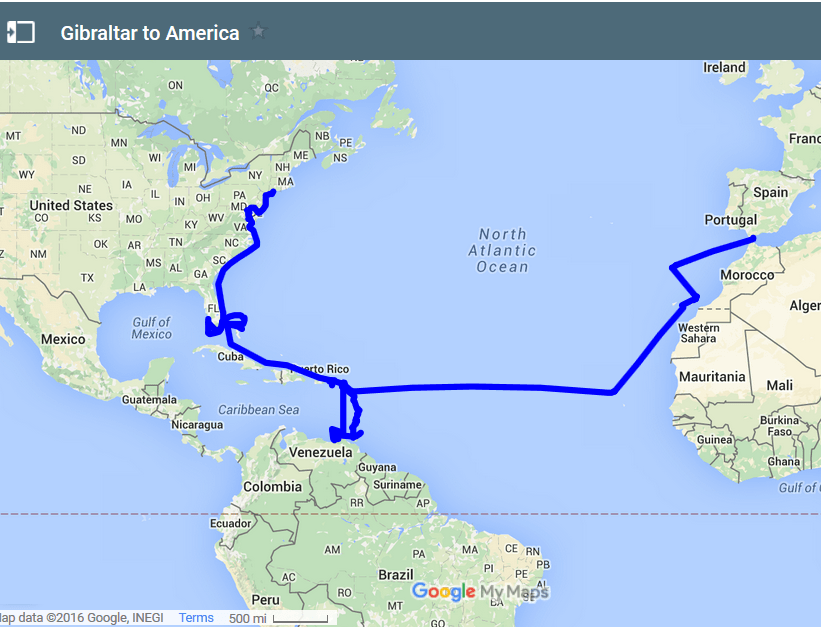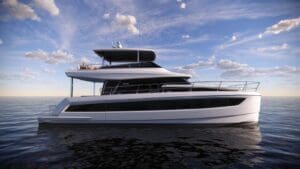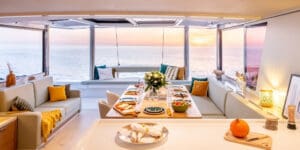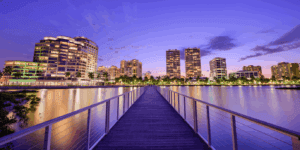Overseas Radio Network – Preparing for an Ocean Crossing
 Topics in Overseas Radio Network Show 8, Segment 3:
Topics in Overseas Radio Network Show 8, Segment 3:
- Preparing for an ocean crossing
- Readying the boat
- Provisioning
- Preparing for emergencies at sea
- Living space aboard a boat
GARY FRETZ: Welcome back to our show. I am Gary Fretz with my co-hosts, Stephen and Estelle Cockcroft. And we talking about getting off the grid. And, Stephen, you have been around the world just about 2 times. And what do you have to do to get ready for a long crossing like go across the ocean?
For a transcript of this podcast, click “read more” below.
Preparing for Ocean Crossings
STEPHEN COCKCROFT: Well, it is a process that kind of becomes second nature. If you are going to do a long journey in your car, what are you going to do? You are going to check the tire pressure. You are going to check the oil. You are going to check that the car is in good shape. You are going to get a map or you are going to figure out what your route is going to be, etc.
Plan Your Route
It is much the same for crossing the ocean. If you are going to make the crossing there are a couple of, there is a sequence. And the important issues are, you know, what is your route? You know, a lot of people believe in these E-Charts when they sail with computers and charts. Well, you know, good for them. But I am not that trusting. If you get struck by lightning, which is likely to happen, your electronics get fried. You are like a blind man. You don’t have any charts.
So I go out and collect charts for every part of my journey, paper charts. Sometimes I might not use them. I might rely on my electronic charts, but I will always have paper back-up charts. (You’ll) never find me on the water with just electronic charts, too risky. So passage planning…I will plan my routes and I will make sure I got charts. I’ll make sure I got cruising guides and instructions as to where I am going. Requirements on the other side: pass ports, ship papers, etc.
Prepare for Port Entry
I will make sure I got the right flag for the country, because when you enter a foreign country you have to fly their flag on the starboard spread. It is called a courtesy flag and it is expected that you fly the national flag of the country you are in as a courtesy. You need a yellow flag which shows that you are seeking customs. [See more on flag etiquette aboard a boat.] Then we start looking at the boat and saying, okay, well let’s make sure everything is good on the boat. Generally, I will make sure that the engines aren’t in need of service.
Prepare the Boat for Crossing
I will always dive on the boat or get the boat dived on to look at my running gear, my propellers, the bottom of the boat…make sure that everything is good down there. I will make sure that I got spare lines. I will make sure that I got spare engine components and every reasonable spare that one would expect to use, I would carry.
Then, of course, you have to make sure you got enough fuel. If you’re doing a 2,000-mile crossing, you know, you are not going to be able to motor the whole way. But you calculate what the worst case is. Engines, these small diesels, use about a gallon an hour. So, if you are going to motor 100 hours, you need 100 gallons.
A lot of boats fuel tanks are not that big, so what you probably do is carry some bladder tanks with spare fuel.
If you have a water maker what you do is fill your tanks. And every time your water gets low, you fill it up with the water maker. You don’t wait ‘til it is empty because if the water maker goes then you got no water. If you don’t have a water maker, you know, I’ve made many passages with no water maker, I would carry…I would buy…lots and lots of water. Put water bottles in every single hole so that I have no chance of running out of water. One of the big issues for me is I always carry more water than I need. Make sure my sails are in good condition and then, of course, we get down to provisioning. Provisioning is really easy. I ask Estelle to do it. I don’t know if she wants to say anything about it.
Provisioning for an Ocean Crossing
ESTELLE COCKCROFT: That’s…I love shopping to start with…and then having to do the provisioning for a long tip is an arduous task. But usually I would go out and decide what my menu would be for the next 2 weeks and then repeat the menu after 2 weeks. So I will provision for those 2 weeks for each menu for the 2 of us or how many are on board or for the time that we will be on board. And then I always provision for at least 2 weeks extra.
Just in case you never know what might happen. And then always in my bins I keep can food of every variety. You know, you just don’t know what might happen on the boat or on the shore or something so you have to eat. I guess it is just, I lived on a farm and we just use to have all these stores on board. Stephen doesn’t particular like it because I use to have all these rusty cans lying around. But now I treat these cans and I make sure they don’t become rusty because obviously they could also become a hazard for food.
So that is my modus operandi. Make sure that I provision for 2 weeks menu and then repeat that menu after 2 weeks.
STEPHEN: There have been a few exciting instances. When we were in the Indian Ocean, we thought we were really cleaver and we bought this bunch of bananas…probably weighed about 100 and something pounds. And, of course, we had nowhere to put it, so we hung it on the arch of the back of the boat. Of course, not thinking that if we encountered rough weather this thing would start swing around with deadly effect. And so you’ve got to secure your stores is what I am trying to say and Estelle want to say.
ESTELLE: Well, also, we caught fish obviously on the way and at one point we caught this enormous fish and I didn’t know what to do with the fish in the end. We were so sick of fish after about 2 weeks of eating fish every day, fish cakes, fish poached, barbeque fish, canned fish. I made everything I could and, in the end, we actually threw it away because we were sick of fish.
STEPHEN: Fish is a good supplement to your diet. So essentially what you want to do is you want to leave the dock with your water tanks full, spare water, your fuel tanks full and spare fuel. You want to make sure you have at least 2 propane cylinders. I have run out of propane on one trip. It was very ugly.
Prepare for Emergencies at Sea
You want to make sure you have all the spares you need. You want to make sure that your sails are in good condition. You want to make sure that the spares list…I have a spares list that I just check off and make sure that is all in good shape. Kind of important, you want to make sure that your life raft is up to date. And I have a grab bag with a lot of emergency gear. It is a water proof bottle which can float which I would fling overboard in the worst case. It’s got all sorts of survival gear. I will make sure that’s all sorted out.
I will check my flares, make sure my flares are up to date and just generally check that the boat is in good condition. And then of course the most important thing I will be sitting watching the weather because weather has trends. And I will watch the weather and just make sure that when the right window comes, we will do our final shopping, check out, and then we head off into the wild blue yonder. One thing you got to remember when making a long passage it’s not a race, it’s survival. It’s survival thing where you have X amount to resources. You have left the shore and you have to jealously protect those resources.
Don’t waste fuel. Don’t waste water. As I was saying I always have one water tank completely closed off so that if somebody by mistake leaves a water tap open or a faucet open and all the water runs out, we still have one tank that is absolutely secure. When your water gets low run your water make sure that your tanks are always full. Never waste anything.
If something goes wrong, then fix it immediately because normally when you get into trouble it is a combination of things that went wrong, not just one thing. And so what you want to do is, you want to constantly monitor everything on the boat. You want to monitor your battery levels, you know, the voltage, your fuels levels, checking your engine rooms, check your voltages regularly, and basically just treat it as a survival thing and protect your resources jealously. Because most boats have redundancy so if you lose one system, chances are you got a backup. But when you lose that system, do everything you can to fix it because if your backup goes, you don’t have anything.
So treat it as a survival exercise and, of course, there is nothing nicer than seeing your destination come up over the horizon. It is exciting and it is fun. And you feel like Christopher Columbus when you get to the other side.
Living Space Aboard a Boat
GARY: Let’s talk about the space available on the yacht. You know, I have seen these families of 4 on boats as small as 28ft and they, but they seem to be oblivious to the fact that, you know, that they didn’t have a giant mansion. What do you think about that?
ESTELLE: I think we talked about this before that, you know, you just pare it down. A small boat doesn’t equal small living. You are out there, you are experiencing new things living life to it s fullest capacity and so that makes up for any hardship or discomfort that you might have.
GARY: Okay, well, we are getting short on time and we are going to take a short break we will be right back to continue this discussion. You are listening to “Yachts: The Perfect Escape Vehicle” only on the Overseas Radio Network.





